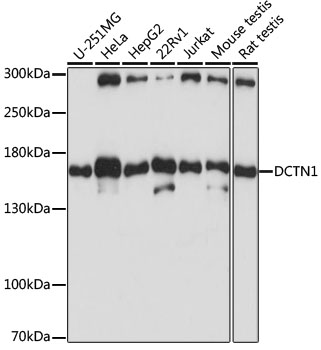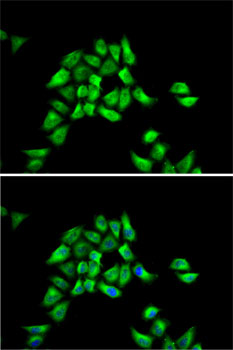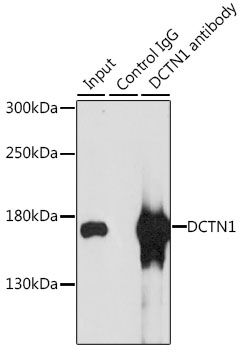-
Product Name
DCTN1 Polyclonal Antibody
- Documents
-
Description
Polyclonal antibody to DCTN1
-
Tested applications
WB, IF, IP
-
Species reactivity
Human, Mouse, Rat
-
Alternative names
DCTN1 antibody; DAP-150 antibody; DP-150 antibody; P135 antibody; dynactin subunit 1 antibody
-
Isotype
Rabbit IgG
-
Preparation
Antigen: Recombinant fusion protein containing a sequence corresponding to amino acids 945-1139 of human DCTN1 (NP_001128513.1).
-
Clonality
Polyclonal
-
Formulation
PBS with 0.02% sodium azide, 50% glycerol, pH7.3.
-
Storage instructions
Store at -20℃. Avoid freeze / thaw cycles.
-
Applications
WB 1:500 - 1:2000
IF 1:20 - 1:100
IP 1:50 - 1:100 -
Validations

Western blot - DCTN1 Polyclonal Antibody
Western blot analysis of extracts of various cell lines, using DCTN1 antibody at 1:1000 dilution.Secondary antibody: HRP Goat Anti-Rabbit IgG (H+L) at 1:10000 dilution.Lysates/proteins: 25ug per lane.Blocking buffer: 3% nonfat dry milk in TBST.Detection: ECL Basic Kit .Exposure time: 10s.

Immunofluorescence - DCTN1 Polyclonal Antibody
Immunofluorescence analysis of HeLa cells using DCTN1 antibody . Blue: DAPI for nuclear staining.

Immunoprecipitation - DCTN1 Polyclonal Antibody
Immunoprecipitation analysis of 200ug extracts of MCF-7 cells, using 3 ug DCTN1 antibody . Western blot was performed from the immunoprecipitate using DCTN1 antibody at a dilition of 1:1000.
-
Background
Plays a key role in dynein-mediated retrograde transport of vesicles and organelles along microtubules by recruiting and tethering dynein to microtubules. Binds to both dynein and microtubules providing a link between specific cargos, microtubules and dynein. Essential for targeting dynein to microtubule plus ends, recruiting dynein to membranous cargos and enhancing dynein processivity (the ability to move along a microtubule for a long distance without falling off the track). Can also act as a brake to slow the dynein motor during motility along the microtubule. Can regulate microtubule stability by promoting microtubule formation, nucleation and polymerization and by inhibiting microtubule catastrophe in neurons. Inhibits microtubule catastrophe by binding both to microtubules and to tubulin, leading to enhanced microtubule stability along the axon. Plays a role in metaphase spindle orientation. Plays a role in centriole cohesion and subdistal appendage organization and function. Its recruitement to the centriole in a KIF3A-dependent manner is essential for the maintenance of centriole cohesion and the formation of subdistal appendage. Also required for microtubule anchoring at the mother centriole. Plays a role in primary cilia formation.
Related Products / Services
Please note: All products are "FOR RESEARCH USE ONLY AND ARE NOT INTENDED FOR DIAGNOSTIC OR THERAPEUTIC USE"
